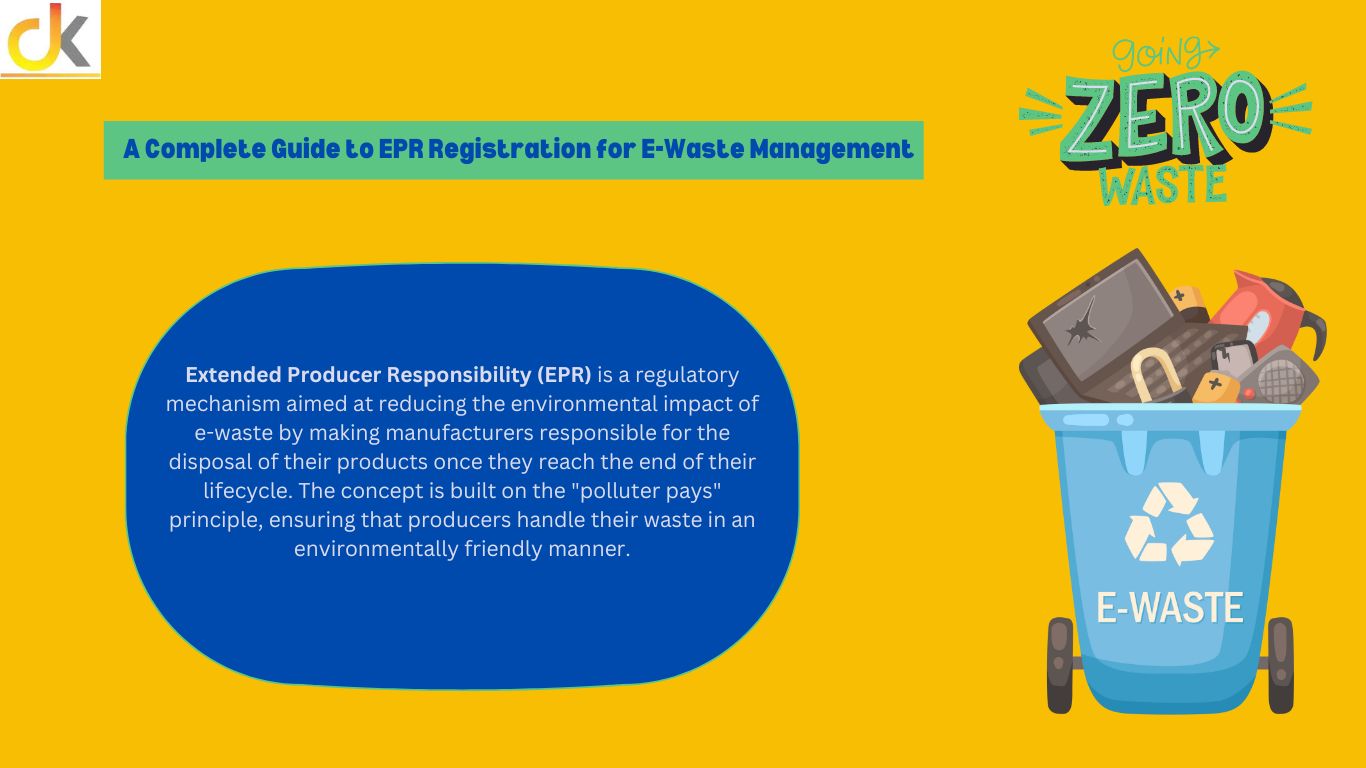In today’s world, Electronic Waste (E-Waste) has become a major environmental concern due to the growing dependence on electronic devices. As technology advances, the amount of discarded electronics increases, leading to the need for efficient waste management. Extended Producer Responsibility (EPR) is a crucial approach to managing e-waste, holding producers accountable for the entire lifecycle of their products. This guide explores the critical aspects of EPR registration for e-waste management, providing comprehensive insights into the processes, benefits, and obligations associated with this regulatory framework.
What is EPR for E-Waste Management?
Extended Producer Responsibility (EPR) is a regulatory mechanism aimed at reducing the environmental impact of e-waste by making manufacturers responsible for the disposal of their products once they reach the end of their lifecycle. The concept is built on the “polluter pays” principle, ensuring that producers handle their waste in an environmentally friendly manner.
In India, the E-Waste Management Rules, 2016, set forth the guidelines for producers to adhere to EPR regulations. This framework applies to various electronic products, from smartphones and laptops to larger appliances like refrigerators and air conditioners. EPR mandates that producers either manage the disposal of their products directly or partner with authorized recyclers and waste management companies.
Why is EPR Registration Important for E-Waste?
EPR registration for e-waste management is one of the fastest-growing waste streams globally, containing hazardous substances such as lead, cadmium, mercury, and brominated flame retardants. Improper disposal of e-waste can cause severe environmental damage, polluting soil, air, and water. By ensuring that producers take responsibility for their waste, EPR contributes significantly to:
- Reduction in pollution: Proper recycling and disposal reduce the amount of toxic materials entering the environment.
- Resource conservation: Many valuable metals and materials in electronics, such as gold, silver, and copper, can be recovered and reused.
- Legal compliance: Producers who register for EPR avoid penalties and sanctions from regulatory bodies.
Key Steps to Complete EPR Registration for E-Waste Management
1. Identify Your E-Waste Obligations
The first step in the EPR registration process is understanding your obligations as a producer. Depending on the type and volume of electronic products you manufacture or import, you will have specific responsibilities. These may include setting up take-back systems, partnering with authorized recyclers, and meeting collection targets.
2. Prepare and Submit the EPR Plan
To comply with EPR regulations, producers must submit a detailed EPR plan to the relevant authority, such as the Central Pollution Control Board (CPCB) in India. The EPR plan outlines how the producer intends to manage the e-waste generated by their products. The plan must include details such as:
- Collection strategy: How the company will collect discarded electronics from consumers.
- Recycling partners: Information about authorized recyclers who will handle the e-waste.
- Awareness campaigns: Plans for educating consumers on proper disposal and recycling practices.
3. Obtain Authorization
Once the EPR plan is submitted, the regulatory authority will review the plan and grant authorization if it meets all the criteria. This process involves verifying the producer’s commitment to managing e-waste and ensuring that they have partnered with accredited recyclers.
4. Implement Collection and Recycling Programs
After receiving authorization, producers must begin implementing their collection and recycling programs. This includes setting up collection points, reverse logistics systems, and working with authorized recyclers to handle the e-waste responsibly. Producers may also establish Producer Responsibility Organizations (PROs) to assist with these tasks.
5. Compliance Monitoring and Reporting
Producers are required to submit regular reports to the regulatory authority detailing the amount of e-waste collected and recycled. Failure to meet collection targets or comply with other aspects of the EPR plan can result in fines and other penalties.
Benefits of EPR Registration for E-Waste
1. Environmental Protection
EPR plays a vital role in mitigating the harmful effects of electronic waste on the environment. By ensuring that producers are responsible for recycling and proper disposal, EPR reduces the likelihood of toxic materials entering landfills, water bodies, and the air. This leads to a cleaner, healthier environment and contributes to global efforts to combat climate change.
2. Resource Recovery
Electronic products contain a variety of valuable materials such as precious metals and rare earth elements. Through proper recycling, these materials can be recovered and reused, reducing the need for new resource extraction. EPR encourages producers to develop more sustainable products with a focus on recyclability and reduced environmental impact.
3. Corporate Responsibility and Brand Image
Companies that embrace EPR demonstrate their commitment to sustainability and corporate responsibility. Consumers are becoming increasingly conscious of environmental issues, and companies that actively participate in waste management initiatives can enhance their brand image and build stronger relationships with environmentally conscious customers.
4. Legal Compliance
Adhering to EPR regulations ensures that companies comply with national and international e-waste management laws. This helps producers avoid legal complications, fines, and sanctions that may arise from non-compliance. In countries like India, non-compliance with EPR rules can lead to severe penalties, making registration essential for avoiding costly legal issues.
5. Economic Opportunities
The e-waste management sector presents significant economic opportunities for businesses. By investing in recycling infrastructure and partnering with authorized recyclers, companies can create new revenue streams while also fulfilling their EPR obligations. Additionally, the recycling industry helps create jobs and supports the circular economy, further boosting economic growth.
Challenges in EPR Registration for E-Waste Management
1. Complex Regulatory Requirements
If you are considering to import and export then there is one of the primary challenges producers face during the EPR registration process is navigating the complex regulatory framework. Producers must stay up to date with the latest rules and regulations, which can vary from one jurisdiction to another. Ensuring compliance with all legal obligations requires careful planning and coordination with waste management partners.
2. Collection Infrastructure
Setting up an effective collection and recycling infrastructure can be difficult, especially for smaller companies. Many producers may lack the resources or expertise to establish extensive collection networks, making it challenging to meet the recycling targets set by regulatory authorities. Collaboration with PROs or third-party recyclers can help mitigate this issue.
3. Consumer Awareness
Another challenge is educating consumers about proper disposal methods for e-waste. Without consumer participation, collection programs may fail to achieve their targets. Producers must invest in consumer awareness campaigns to encourage responsible disposal and recycling of electronic products.
How to Overcome Challenges in EPR Registration
Producers can overcome the challenges of EPR registration by:
- Collaborating with PROs: Producer Responsibility Organizations can help manage the logistics of e-waste collection and recycling, making the process more efficient.
- Leveraging technology: Companies can use digital platforms to track their e-waste, monitor collection targets, and generate reports for regulatory authorities.
- Consumer engagement: Invest in consumer education programs to encourage responsible e-waste disposal and recycling practices.
Conclusion
EPR registration for e-waste management is a crucial step in tackling the growing environmental challenges posed by electronic waste. By ensuring producers take responsibility for their products from cradle to grave, EPR promotes sustainable waste management practices, environmental protection, and resource recovery. Companies that proactively embrace EPR not only comply with legal requirements but also contribute to a more sustainable future.




